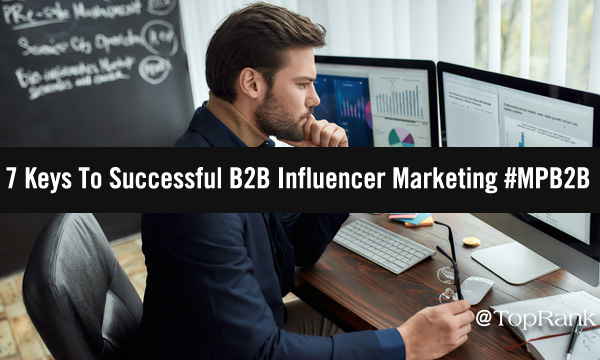
 MarketingProfs educational content director Kerry O'Shea Gorgone kicked off an insightful #MPB2B Forum 2020 session with our CEO Lee Odden exploring B2B influencer marketing, “New Research: How to be Successful With Influencer Marketing.” Lee began by explaining that when it comes to B2B influencer marketing, to create and maintain a successful program you've got to do the hard work and be smart about it, and set about to demystify some of the lesser-known aspects of B2B influencer marketing by sharing what he’s learned from having been deeply involved with the practice for the past eight years. Let’s take a look at the new B2B influencer marketing research Lee explored in his insightful MarketingProfs B2B Forum #MPB2B 2020 session.
MarketingProfs educational content director Kerry O'Shea Gorgone kicked off an insightful #MPB2B Forum 2020 session with our CEO Lee Odden exploring B2B influencer marketing, “New Research: How to be Successful With Influencer Marketing.” Lee began by explaining that when it comes to B2B influencer marketing, to create and maintain a successful program you've got to do the hard work and be smart about it, and set about to demystify some of the lesser-known aspects of B2B influencer marketing by sharing what he’s learned from having been deeply involved with the practice for the past eight years. Let’s take a look at the new B2B influencer marketing research Lee explored in his insightful MarketingProfs B2B Forum #MPB2B 2020 session.
1 — Utilize Influencers to Rise Above Pandemic Uncertainties
 The pandemic has given rise to many new challenges that B2B marketers have had to deal with, including budgets that are often on hold while at the same time sales goals are not, leading to high levels of uncertainty. B2B influencer marketing offers a powerful solution for rising above these uncertainties, by unleashing the power of collaboration with experts, Lee noted. While we’ve been used to buyers actively looking for solutions, there’s a greater reliance on content today, making the trustworthiness of content sources more important than ever, Lee pointed out. To help address the issue of trustworthiness and how B2B influencer marketing can help marketers now more than ever, Lee explained how TopRank Marketing produced the industry’s first 2020 State of B2B Influencer Marketing Report, with groundbreaking insights from 20 top B2B brands. Lee shared how the report’s data makes it clear that B2B influencer marketing:
The pandemic has given rise to many new challenges that B2B marketers have had to deal with, including budgets that are often on hold while at the same time sales goals are not, leading to high levels of uncertainty. B2B influencer marketing offers a powerful solution for rising above these uncertainties, by unleashing the power of collaboration with experts, Lee noted. While we’ve been used to buyers actively looking for solutions, there’s a greater reliance on content today, making the trustworthiness of content sources more important than ever, Lee pointed out. To help address the issue of trustworthiness and how B2B influencer marketing can help marketers now more than ever, Lee explained how TopRank Marketing produced the industry’s first 2020 State of B2B Influencer Marketing Report, with groundbreaking insights from 20 top B2B brands. Lee shared how the report’s data makes it clear that B2B influencer marketing:
- Improves customer experience (CX)
- Positively impacts marketing overall
- Increases brand awareness
- Improves lead generation
- Builds brand reputation and advocacy
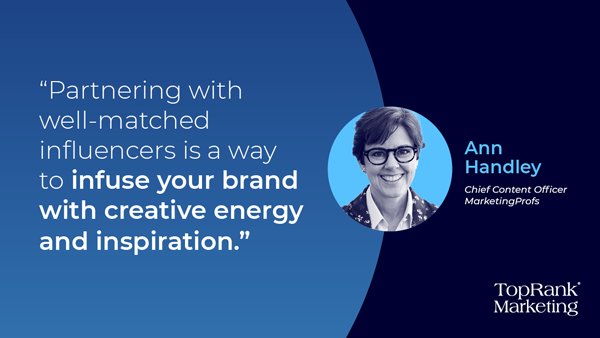 [bctt tweet="“Partnering with well-matched influencers is a handy way to infuse your brand with creative energy and inspiration.” — Ann Handley @MarketingProfs" username="toprank"]
[bctt tweet="“Partnering with well-matched influencers is a handy way to infuse your brand with creative energy and inspiration.” — Ann Handley @MarketingProfs" username="toprank"]
2 — What Will Effective B2B Influencer Marketing Look Like in 2021?
Using remote work company monday.com* as an example, Lee shared how B2B influencer marketing had helped the platform achieve social reach from influencer shares of brand content that reached 1,790 percent above the target goal. Lee also explained how monday.com successfully utilized B2B influencer marketing to partner with remote work experts and to drive discussions via live-stream that resulted in exposure to thousands of potential customers.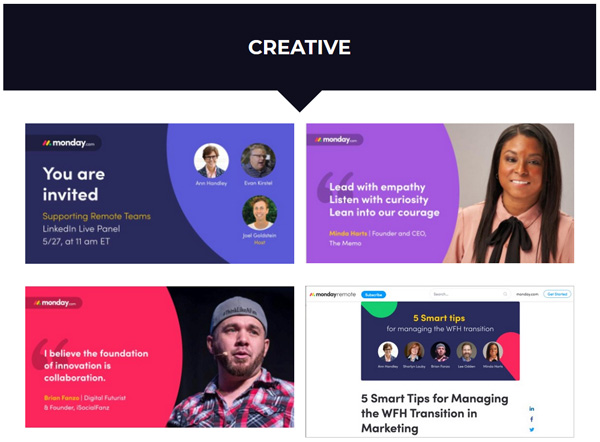 In another example, Lee showed how IT service management software firm Cherwell Software* used B2B influencer marketing to achieve 342 percent better click-through-rate (CTR) on influencer content, and how the firm was successfully able to use influencers to build trust around a topic they hadn't previously been known for, resulting in some 90 percent entirely new people in their database.
In another example, Lee showed how IT service management software firm Cherwell Software* used B2B influencer marketing to achieve 342 percent better click-through-rate (CTR) on influencer content, and how the firm was successfully able to use influencers to build trust around a topic they hadn't previously been known for, resulting in some 90 percent entirely new people in their database. 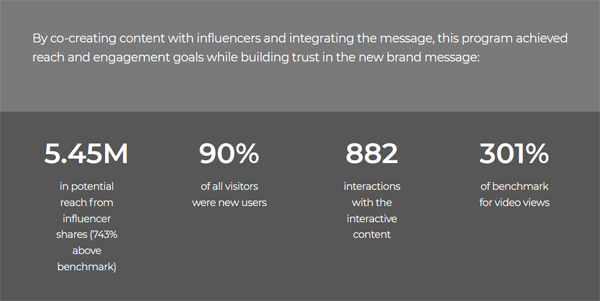 LinkedIn* served as another powerful example shared by Lee, who explained how the professional social media platform created a strong community of 75 influencers — recognizing the importance of investing in influencer relationships, and also the growing need for always-on B2B influencer marketing programs. Lee shared how LinkedIn had partnered and developed relationships with influencers, how it was able to create a community of respected voices that became an ongoing voice of the brand, and how doing so allowed LinkedIn to be the best answer for its customers.
LinkedIn* served as another powerful example shared by Lee, who explained how the professional social media platform created a strong community of 75 influencers — recognizing the importance of investing in influencer relationships, and also the growing need for always-on B2B influencer marketing programs. Lee shared how LinkedIn had partnered and developed relationships with influencers, how it was able to create a community of respected voices that became an ongoing voice of the brand, and how doing so allowed LinkedIn to be the best answer for its customers.
3 — What Makes B2B Influencer Marketing Content So Special?
B2B influencer marketing adds invaluable third-party credibility and trust to content, Lee said, also noting that it helps to extend content creation and expertise and to infuse the voice of the customer in your brand content, creating powerful trusted voices. It also offers the added benefit of creating the type of inspiring promotion that traditional advertising may not be nearly as successful in doing, Lee suggested. Lee then focused on steps B2B marketers can take to achieve success with an influencer marketing program.4 — Scaling With Strategy
Scaling with strategy begins with finding the topics most relevant to your business, and Lee used an example from SAP*’s Tech Unknown podcast. The podcast came about as a way to serve both internal customers and multiple external audiences, using an industry influencer — in this case technology futurist Tamara McCleary — as the podcast’s host.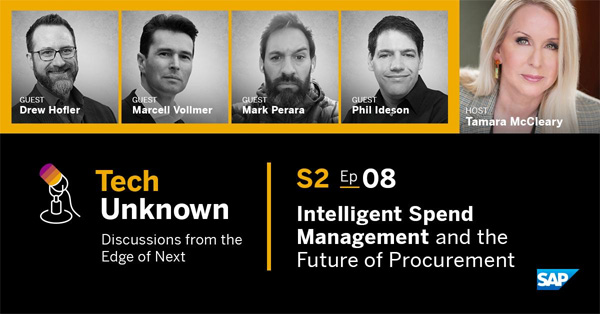 Lee shared how influencers serve multiple uses for the SAP Tech Unknown podcast series, now in its third season, and how by following best-practices the podcast’s content has also been successfully repurposed into eBook and other content formats.
Lee shared how influencers serve multiple uses for the SAP Tech Unknown podcast series, now in its third season, and how by following best-practices the podcast’s content has also been successfully repurposed into eBook and other content formats.
5 — Understand Topical Demand Using Specialized Software
Lee shared how using tools including SEMrush and BuzzSumo can play an important role in helping to answer customer questions from third-party experts, and also explained how using the right software makes it possible to validate ideas with relevant data. Lee recommended data-driven influencer marketing platform Traackr to help qualify and validate potential influencers and discover whether they have the right tone of voice, cadence, and other relevant criteria. When it comes time for publishing B2B influencer marketing content co-created with influencers, it’s important to incorporate blog content as a part of your organization’s overall content publishing strategy, Lee noted, as it’s a vital part of the diverse array of content publishing formats that should be utilized when sharing co-created influencer content.6 — Use an Always-On Engagement Strategy
Lee stressed the growing importance of an always-on engagement strategy, citing research from the 2020 State of B2B Influencer Marketing Report showing its effectiveness, and sharing a quote from Garnor Morantes, group marketing manager at LinkedIn: "Being 'always-on' has allowed our team to build meaningful relationships with influencers," Garnor said.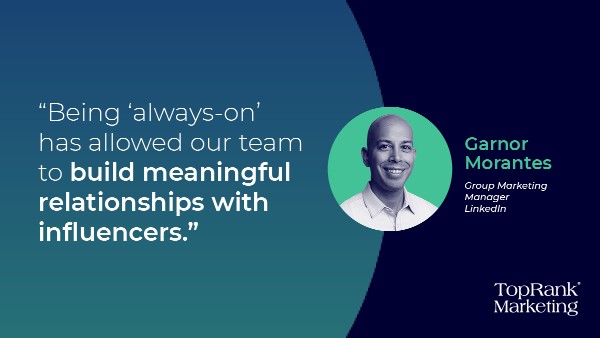 [bctt tweet="“Being 'always-on' has allowed our team to build meaningful relationships with influencers.” — Garnor Morantes of @LinkedIn" username="toprank"] An always-on approach that’s centered around creating relationships helps build community and advocacy, Lee explained, noting the importance of playing the long game. Lee presented a case study showing the effectiveness of B2B influencer marketing, from Alcatel-Lucent Enterprise (ALE), which created a successful IT Vanguard Awards program using IT industry influencers as judges. The awards program shared the advice and insight of honorees and helped to make them into influencers, Lee noted of the program, which went on to win an award at the 2020 Content Marketing Awards.
[bctt tweet="“Being 'always-on' has allowed our team to build meaningful relationships with influencers.” — Garnor Morantes of @LinkedIn" username="toprank"] An always-on approach that’s centered around creating relationships helps build community and advocacy, Lee explained, noting the importance of playing the long game. Lee presented a case study showing the effectiveness of B2B influencer marketing, from Alcatel-Lucent Enterprise (ALE), which created a successful IT Vanguard Awards program using IT industry influencers as judges. The awards program shared the advice and insight of honorees and helped to make them into influencers, Lee noted of the program, which went on to win an award at the 2020 Content Marketing Awards.  Lee explained how TopRank Marketing has a proven process of working with influencers for many of the top brands on the planet such as Adobe, LinkedIn, Dell, 3M and others, and he urged those considering a B2B influencer marketing program to look closely at who really influences your buyers. Only then can you move forward with investing in and executing a successful influencer program, Lee observed, which could start with outside help in the form of a pilot B2B influencer marketing program. By using the insight gained from a pilot influencer program, B2B marketers can further build an influencer strategy, grow a content community of influencers, and activate return on investment (ROI), Lee noted as he concluded his #MPB2B presentation.
Lee explained how TopRank Marketing has a proven process of working with influencers for many of the top brands on the planet such as Adobe, LinkedIn, Dell, 3M and others, and he urged those considering a B2B influencer marketing program to look closely at who really influences your buyers. Only then can you move forward with investing in and executing a successful influencer program, Lee observed, which could start with outside help in the form of a pilot B2B influencer marketing program. By using the insight gained from a pilot influencer program, B2B marketers can further build an influencer strategy, grow a content community of influencers, and activate return on investment (ROI), Lee noted as he concluded his #MPB2B presentation.
7 — Bonus #MPB2B B2B Influencer Marketing Insight
During the post-session question and answer period, Lee was asked for advice writing about non-marketing-related content, and he urged marketers to always strive to empathize with the audience, and to make content meaningful to them. Using an example of a shareable social media message, Lee noted that tweets created for influencers won’t work nearly as well when an organization’s entire team shares these same messages, and instead recommended the messaging be changed to better suit those sharing the content in a more general way. Lee was also asked whether B2B influencer marketing can also work for smaller firms, and he shared several examples of TopRank Marketing’s work with small-to-medium size businesses (SMBs), utilizing locally influential people, for firms such as Welter Heating and Prophix Software. Welter Heating was able to utilize local celebrity influencers to poll and gather feedback, giving them something fun, easy, and interesting to do, which was then made into round-up posts for the company’s website, Lee noted. Lee explained how despite the fact that financial management software solution provider Prophix Software was centered around a fairly niche topic, they were able to find relevant specialized influencers that fit and worked well.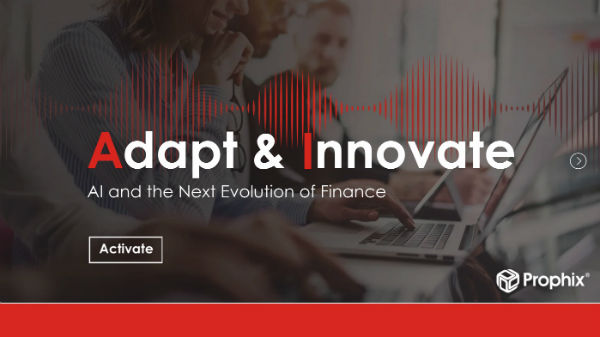 Asked to provide a quick tip for getting started in B2B influencer marketing, Lee suggested making and publishing a list of the people who are influential in your particular industry, as a way to honor them and then also to use as an opportunity to follow up with each person with a brief and easy-to-fulfill request for a future co-collaboration project such as an interview or eBook. While B2B influencer marketing had previously been roughly 80-90 percent of the unpaid variety, that number is now up to around 25 percent paid, Lee said, noting that there are now more B2B professionals who bring to the table the type of influencer skills worth paying for, such as much more robust and relevant content from brandividuals. When asked about budgeting, Lee suggested that B2B influencer marketing can be budgeted as with any other advertisement expenditure, and explained how using paid influencers can be a great way to find and recruit lesser-known influencers. Lee suggested that it’s helpful to have a long runway for building influencer relationships, and explained how TopRank Marketing was able to find remote work experts for client monday.com by using Traackr and a variety of other criteria to those most influential around the topic, along with those who have a community of followers that will respond to that topic. These join other metrics including network size, publishing cadence and format, along with the influencer’s particular values, Lee noted, before they are ultimately approved by the client. Another question Lee fielded was who within an organization should run a B2B influencer marketing program, and he noted that in the early days of influencer marketing it was likely to be the director of marketing or people in social media roles — all community-oriented professionals. As time has passed, Lee explained, with B2B influencer marketing having grown in both success and sophistication, new dedicated roles are being created, such as those held by people including Rani Mani, head of global employee advocacy at Adobe*, and Ursula Ringham, head of global influencer marketing at SAP, and there has also been more integration with other departments at organizations. Lee’s final question was whether B2B influencer marketing could be used to test new markets, and Lee shared how it can be successfully used to find new marketing topics by conducting tests with various content formats to see how each resonates, before ultimately deciding whether to scale or bail, Lee noted. Learn more about B2B influencer marketing from Lee by watching our #InsideInfluence series, including the latest episode "Inside Influence EP06: Amisha Gandhi from SAP on the Power of Mutual Value in B2B Influencer Marketing." Be sure to check out our additional #MPB2B 2020 coverage listed below:
Asked to provide a quick tip for getting started in B2B influencer marketing, Lee suggested making and publishing a list of the people who are influential in your particular industry, as a way to honor them and then also to use as an opportunity to follow up with each person with a brief and easy-to-fulfill request for a future co-collaboration project such as an interview or eBook. While B2B influencer marketing had previously been roughly 80-90 percent of the unpaid variety, that number is now up to around 25 percent paid, Lee said, noting that there are now more B2B professionals who bring to the table the type of influencer skills worth paying for, such as much more robust and relevant content from brandividuals. When asked about budgeting, Lee suggested that B2B influencer marketing can be budgeted as with any other advertisement expenditure, and explained how using paid influencers can be a great way to find and recruit lesser-known influencers. Lee suggested that it’s helpful to have a long runway for building influencer relationships, and explained how TopRank Marketing was able to find remote work experts for client monday.com by using Traackr and a variety of other criteria to those most influential around the topic, along with those who have a community of followers that will respond to that topic. These join other metrics including network size, publishing cadence and format, along with the influencer’s particular values, Lee noted, before they are ultimately approved by the client. Another question Lee fielded was who within an organization should run a B2B influencer marketing program, and he noted that in the early days of influencer marketing it was likely to be the director of marketing or people in social media roles — all community-oriented professionals. As time has passed, Lee explained, with B2B influencer marketing having grown in both success and sophistication, new dedicated roles are being created, such as those held by people including Rani Mani, head of global employee advocacy at Adobe*, and Ursula Ringham, head of global influencer marketing at SAP, and there has also been more integration with other departments at organizations. Lee’s final question was whether B2B influencer marketing could be used to test new markets, and Lee shared how it can be successfully used to find new marketing topics by conducting tests with various content formats to see how each resonates, before ultimately deciding whether to scale or bail, Lee noted. Learn more about B2B influencer marketing from Lee by watching our #InsideInfluence series, including the latest episode "Inside Influence EP06: Amisha Gandhi from SAP on the Power of Mutual Value in B2B Influencer Marketing." Be sure to check out our additional #MPB2B 2020 coverage listed below:
- LinkedIn’s Ty Heath: 3 Enduring B2B Marketing Trends #MPB2
- Adobe’s Rani Mani: 5 Tips For Creating Your B2B Influencer Marketing Love Affair #MPB2B
- 10 Must-See Sessions at MarketingProfs B2B Forum 2020 #MPB2B
- 25 Top B2B Marketing Influencers To Follow In 2021 #MPB2B
The post 7 Keys To Successful B2B Influencer Marketing: New Research From Lee Odden at #MPB2B appeared first on B2B Marketing Blog - TopRank®.
from B2B Marketing Blog – TopRank® https://ift.tt/3krZMiA
via IFTTT
